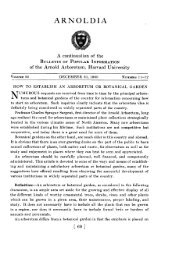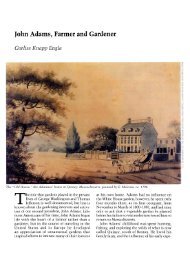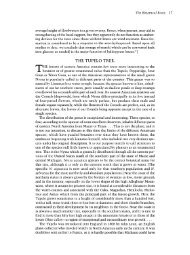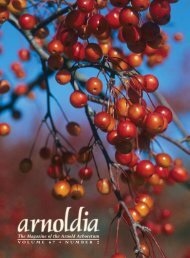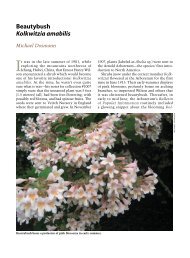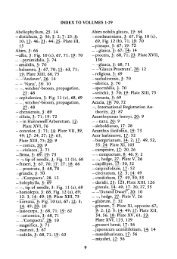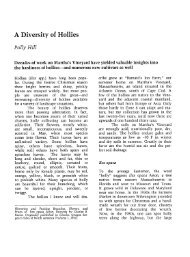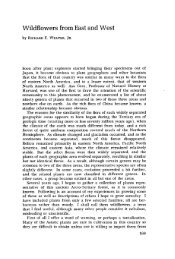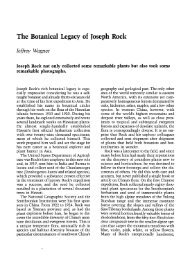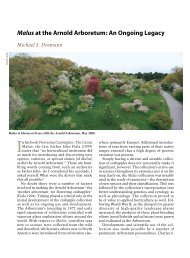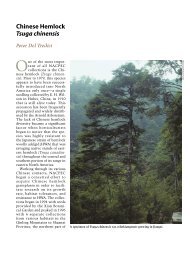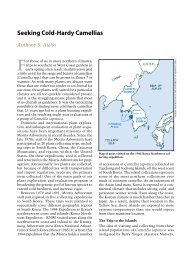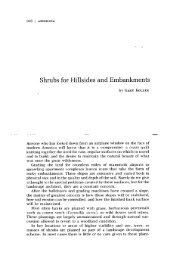Open as a single document - Arnoldia - Harvard University
Open as a single document - Arnoldia - Harvard University
Open as a single document - Arnoldia - Harvard University
You also want an ePaper? Increase the reach of your titles
YUMPU automatically turns print PDFs into web optimized ePapers that Google loves.
‘<br />
20<br />
handsomest and most widely distributed red-flowered species, Aesculus<br />
discolor var. mollis, when in flower one of the handsomest shrubs in<br />
the southern states. Aesculus georgiana with large red and yellow<br />
flowers in compact clusters, its variety pubescens and two hybrid<br />
Buckeyes, Aesculus Bushii and A. Harhisonxi. While these have all<br />
escaped injury the summer-flowering Aesculus parviflora, which is an<br />
old inhabitant of northern gardens and which h<strong>as</strong> not before been injured<br />
in the Arboretum, h<strong>as</strong> lost many stems.<br />
The earliest Roses. On May 17th the first flowers of the se<strong>as</strong>on on<br />
the earliest Roses opened, Rosa Ecae and R. Hugonis. The former is<br />
a native of central Asia and is a small, exceedingly spiny shrub with<br />
small leaves and pale canary yellow flowers not more than an inch in<br />
diameter. R. Hugonis is a large shrub with gracefully arching stems;<br />
the flowers are about two and a half inches in diameter, with bright<br />
clear yellow petals and are very fragrant.<br />
in the Shrub<br />
The plant<br />
Collection is not quite <strong>as</strong> full of flowers <strong>as</strong> it w<strong>as</strong> l<strong>as</strong>t year, but for<br />
the next few days this Rose will be one of the most interesting and<br />
beautiful plants in the Arboretum.<br />
Rhododendron (Azalea) japonicum is in bloom on the lower side of<br />
Azalea Path. This is one of the parents of the hybrid Azalea mollis<br />
of gardens, and h<strong>as</strong> the flame-colored flowers of some of the forms of<br />
that plant. R. japonicum, however, is a much more desirable plant<br />
than any form of Azalea mollis which at best is only short-lived here.<br />
Although discovered and first described many years ago, R. japonicum<br />
h<strong>as</strong> always been one of the le<strong>as</strong>t known in gardens of the hardy Azale<strong>as</strong>.<br />
The large plants in the Arboretum were raised from seed brought<br />
from Japan by Professor Sargent in 1892, but little attention h<strong>as</strong> been<br />
paid to them until recently <strong>as</strong> they were supposed to be Azalea mollis.<br />
Now it is believed here that R. japonicum is the handsomest of all the<br />
hardy Asiatic Azale<strong>as</strong> and a garden plant of exceptional value. Although<br />
the Arboretum plants are not blooming <strong>as</strong> freely <strong>as</strong> l<strong>as</strong>t year,<br />
there are flowers enough on them to show their beauty.<br />
Deutzia grandiflora flowered in the Arboretum for the first time<br />
three years ago and h<strong>as</strong> been again in bloom among the Chinese Shrubs<br />
on Bussey Hill. It is a dwarf plant with flowers about three-quarters<br />
of an inch in diameter, and usually solitary or occ<strong>as</strong>ionally in two- or<br />
three-flowered clusters. It is a native of northern China and there is<br />
re<strong>as</strong>on to hope that it may in the hands of a skilful hybridizer be <strong>as</strong><br />
valuable <strong>as</strong> another north China species, Deutzia parviflora, w<strong>as</strong> in<br />
producing a race of hardy garden Deutzi<strong>as</strong>.<br />
The flower-buds of the Flowering Dogwood (Cornusfiorida) are killed,<br />
and visitors to the Arboretum will be deprived this year of the enjoyment<br />
of the conspicuous flowers of this tree which is one of the most<br />
interesting inhabitants of the forests of e<strong>as</strong>tern North America.



